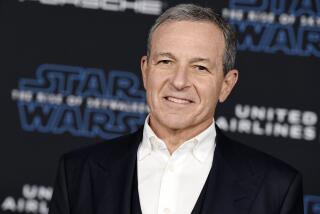Vivendi CEO Has Explaining to Do
PARIS — It was a rocky week for Jean-Marie Messier, or “Master of the World,” as the Vivendi Universal chief executive is known here. France’s most famous and controversial media mogul fended off a revolt by angry Vivendi TV workers and emerged from a raucous meeting of shareholders bruised but with his job intact and apparently the full support of his board of directors.
But Messier isn’t out of the woods yet. Having survived a potential coup in his homeland, the 45-year-old CEO faces an even more daunting task: wooing skeptical investors and analysts on Wall Street to his vision of fashioning a global entertainment leader out of properties ranging from Eminem to Curious George.
Messier seemed to acknowledge as much when he told shareholders at the annual meeting last week that “the world at large still needs to be convinced” that Vivendi’s strategy can succeed.
Although his challenge is clear, the solutions are not.
There are no easy fixes to the problems--from debt reduction to restructuring the company’s struggling pay television unit--that analysts and investors said must be addressed before the company’s languid stock can recover.
Vivendi’s shares continued to fall this week and are down 40% this year. Vivendi’s American depositary receipts on the New York Stock Exchange declined 27 cents to $32.87 on Friday.
A former investment banker who thrives on deal-making, Messier has been on a buying spree during the last two years, spending more than $50 billion in his quest to transform a 149-year-old French water utility into one of the world’s largest entertainment companies.
The acquisitions include Seagram Co.’s Universal Studios, European pay television and movie production company Canal Plus, U.S. education publisher Houghton Mifflin, online music service MP3.com and the film and television businesses of USA Networks--an $11-billion deal was approved by USA shareholders last week.
The mergers are aimed at making Vivendi a global leader in movies, music and publishing and a rival to AOL Time Warner Inc. An apostle of the convergence between new and old media, Messier also believes that cell phones and the Internet will be key pipelines for movies, music and games. But investors aren’t sold on the vision.
Their beef isn’t that Messier has made bad choices. Universal Music Group is the biggest player in the field and Universal Studios is one of the top studios in Hollywood, known for such recent hits as “The Mummy Returns” and the Oscar-winning “A Beautiful Mind.” But investors say they don’t understand how all the various businesses--including the water, sewage and telecom utilities--fit together to form a coherent whole.
Troubles at Other Giants Are Adding to Concern
The struggles of other conglomerates, notably AOL Time Warner and Tyco International Ltd., one of the world’s largest industrial companies, have only brought more skepticism toward Vivendi’s complex web of businesses. Tyco, facing a crisis in investor confidence, scrapped plans to break itself in four parts last week. AOL Time Warner reported a largely paper loss of $54 billion in the first quarter as it wrote down the value of its assets.
So Messier’s biggest task in the near future is explaining his strategy for integrating the companies and building synergies across disparate businesses.
“He has to come to the market with a clear, consistent and justified strategy,” said Mark Harrington, a media analyst with J.P. Morgan, who downgraded his rating on the Vivendi stock from “buy” to “market perform” last week, citing concerns about the company’s strategy. “Vivendi is a very complex company, so the message has got to be almost overly simplistic.”
It’s unclear, for example, what kind of synergies can be built across such diverse businesses, Harrington said.
“Why does it make sense to keep music and education in the same portfolio?” he said.
Investors said Messier hasn’t clearly communicated what exactly Vivendi is--and will be two to three years from now.
“He sends a lot of mixed messages,” said Michael Nathanson, an analyst with Sanford Bernstein, though like other analysts, Nathanson welcomes Messier’s pledge to improve communication with analysts and investors.
Messier Takes Some Blame Over Confusion
At Wednesday’s annual meeting, Messier acknowledged having “personally, involuntarily and clumsily contributed” to confusion about Vivendi’s corporate strategy by “trying to explain too much.”
Some aspects of the company may take more explaining.
Messier said his strategy is to build a global media company, yet half of Vivendi’s income and revenue still come from its water and waste utility, Vivendi Environnement.
Messier has told analysts and company executives that he intends to lower Vivendi’s stake in Vivendi Environnement from 63% to less than 50% while increasing the company’s stake in Cegetel, the profitable French telecommunications business. That would allow Vivendi to lower its debt while also beefing up its image as a pure media company, which is something analysts have been wanting.
But at the shareholders meeting Wednesday, Messier downplayed such plans as “not on the agenda” and a “nonissue.”
Some analysts argue that Vivendi would make more sense if its telecom, media and environment businesses were split in three.
“I just don’t know what the compelling story about the stock is,” Nathanson said. “If you want a mobile phone company, you buy Vodafone. If you want a music company, you buy EMI. What are you buying into with Vivendi?”
As Vivendi has bulked up, so has its debt, fueling criticism that the company has grown too much, too fast.
Vivendi has a debt load of $26 billion, of which about $14.5 billion is from the media and communications businesses.
Messier said reducing debt was a top priority and Vivendi would make no “significant acquisitions” this year. In a move to reassure investors, Vivendi earlier this month sold its professional and health press unit, shaving its debt by $1 billion.
Selling the utility business may prove more challenging. Messier has promised Vivendi Environnement shareholders not to sell to another utility or sell any of the utility’s shares on the stock market. There are dicey political issues involved.
President, Unions Warn About Selling Utility
French President Jacques Chirac and Vivendi’s unions have warned Messier not to sell the utility to foreign interests.
And Messier, already having battled with the French establishment over a controversial management overhaul at Canal Plus, is in no mood for another battle with the French government.
Messier also faces the task of turning around the division’s finances. Canal Plus is the worst-performing group in Vivendi. The unit lost $57 million in the first quarter of 2002.
Restructuring Canal Plus, with its legal obligations to fund French cinema, may prove difficult, as Messier already has learned with the controversy he unleashed by sacking former Chairman Pierre Lescure.
Hostile market conditions make the prospect of a turnaround even tougher.
Virtually all European pay-television operators are reeling from high programming costs, mostly for sports broadcasts, and declines in subscribers, analysts said. Earlier this month, the core business of Germany’s Kirch Group filed for bankruptcy amid huge losses at its Premiere pay-television unit.
The game plan for Canal Plus is just one of the topics that will be on the table next month, when Messier makes his case to analysts during a meeting hosted by Vivendi in New York.
Harrington is reserving judgment until then.
“The past two weeks has put Messier in the hot seat,” Harrington said. “I don’t think he’s had the ability to relax and step back and think about what just happened. Then he can determine what he needs to do and the best way to communicate that to the market.”
More to Read
The biggest entertainment stories
Get our big stories about Hollywood, film, television, music, arts, culture and more right in your inbox as soon as they publish.
You may occasionally receive promotional content from the Los Angeles Times.











